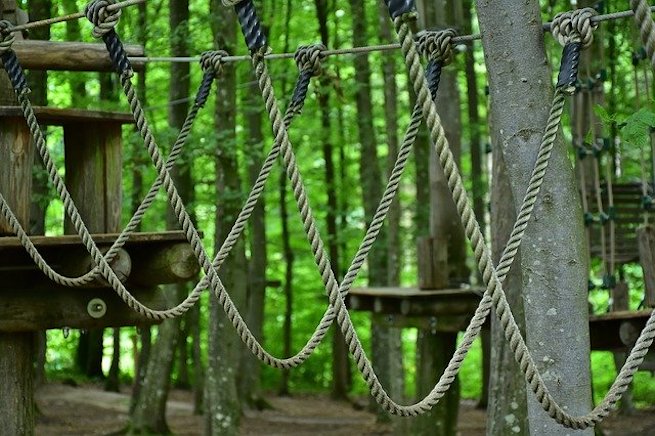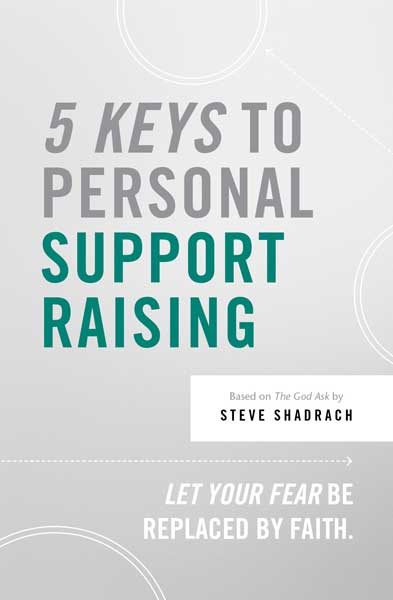
One afternoon, I was coaching a small group as we did a team-building ropes course, and everyone (including me!) was frustrated. “Keep going, everyone. I am sure you are almost there!” I cheered half-heartedly. I was sure there was a point to our current challenge and believed onestaff member when he said it was possible to solve, but my patience had worn out along with my bug spray, and my cheering was waning in the afternoon sun.
The goal was to have two people, connected by their hands, balancing on two separate thin wires about a foot off the ground. The two wires form a V. The two people must stay on the wires from the bottom point of the V until the top, but as the space between them grows, so does the challenge. At the end of the V, the space between the two players is about nine feet wide. Pair after pair attempted the challenge, but everyone failed.
“How’s it going?” My friend, our guide, approached us. I looked at him woefully. He leaned in to me and whispered, “Do you want to know the trick?”
I nodded. Of course, I wanted to know the secret, if there was one!
“When you start at the point of the V, focus all your effort on keeping your partner up. Don’t think about your own balance or self-preservation. As you focus on his balance, and he simultaneously on yours, you find equilibrium.”
We spread the secret and sure enough, within minutes, every pair who had previously failed succeeded without much struggle. It made for interesting conversation on the way home: if we focused more on holding up our brothers and sisters and less on our own fears of falling (or who was looking at our fall), we would inevitably reach our goal—any goal—with less effort.
How many more people (family members? friends?) could we keep up on the wire across from us if we thought more about them and less about us? We live in a world where we so quickly “unfollow” people, create distance in relationships that require too much work, or draw boundaries when we feel uncomfortable. And when people we care about step off to self-preserve, we find a new partner and move on, disgusted with the failure, either theirs (which is judgement) or ours (which is shame). Could we stop our own journey long enough to grab our friend’s, family member’s, or partner’s hand and help us both regain balance?
I have held the hands of my husband, my friends, my mother, people older than me, younger than me, my color, not my color, my gender, not my gender, in the Grand V of life. Do I appreciate the risks they take on my behalf? Do I allow them to talk to me honestly about struggles they see in me? Do I ask them often enough to pray—with me, for me? Am I leaning in, straining for their success? Does their success matter to me as much as my own?
Relationships are our own personal guides to sanctification. Nothing has made me confront my own sin and selfishness as much as this. Whoever is across from you in life, and however they cause you to come face-to-face with your desire to self-preserve over self-sacrifice, we have a choice: we can either embrace self-denial and grow, or resist it and find ourselves falling over and over again.
Life is not meant to be lived in isolation, and disengaging from relationships prevents us from getting the feedback we need to be both challenged and encouraged. Friends and family remind us of who God made us to be and healthy fellowship reflects the connection God wants with us. In a culture where so much is transactional, relationships are able to feed our identity.
You are strong. You are seen. You are worth it.
We all have people in our lives that we love because it’s good for them. Those relationships are sacrificial and we can go to God to be filled up before we pour out into them without reciprocation. But take stock of your people—do you have someone in your life who knows where you struggle? Who makes you laugh? Who would come for you without explanation? Do you have someone who wants to hear about your successes and cheers on your dreams? Do you have someone who you believe would forgive you and whose love is unconditional? Hold onto them and as you help them “stay up on the wire” and you’ll find yourself getting to your own destination.
I’ve now done that ropes course element a hundred times or more, and each time I climb up on the wire, I say a prayer of thanks for the people He’s put across from me. I commit freshly to lean into them, to cheer them on, to be less self-conscious and more others-centered. I delight in our progress and feel encouraged when we persevere. It’s messy: sometimes we fall, sometimes one of us has a bad day, and at times it’s harder than it looks, but people are God’s gift to us. Good friends speak truth and remind us the journey is worth it; they demonstrate commitment and walk alongside us. I am promising to use my days to invest in people—this is the richness of the family of God.

